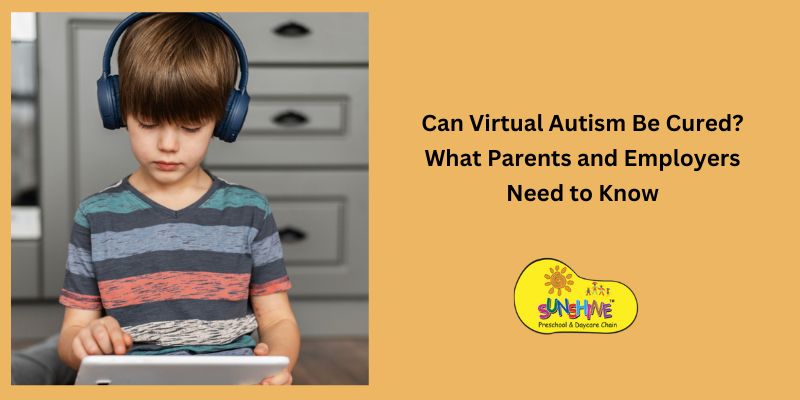Can Virtual Autism Be Cured? What Parents and Employers Need to Know

In today’s tech-driven world, toddlers are exposed to digital devices earlier and more frequently than ever before. While digital learning has its advantages, excessive screen exposure, especially during critical stages of early development, has raised concerns among healthcare professionals, educators, and parents alike. One such emerging concern is Virtual Autism. Though not an official diagnosis, it refers to autism-like symptoms that appear in young children due to extended exposure to screens and limited real-world interaction.
This blog explores the phenomenon, key virtual autism symptoms, the potential for virtual autism recovery, and why high-quality childcare environments like those offered at Sunshine Preschool & Corporate Crèche play a vital role in prevention and support.
What Is Virtual Autism?
Virtual Autism is a behavioural condition where toddlers exhibit symptoms similar to Autism Spectrum Disorder (ASD) due to prolonged screen time. It is considered reversible with timely intervention. Unlike ASD, which is neurodevelopmental and often lifelong, virtual autism stems from environmental factors, specifically the overstimulation caused by screens and the lack of meaningful human interaction during key developmental windows.
Common Virtual Autism Symptoms
While each child may show different signs, the following are frequently reported:
- Speech delays or lack of verbal communication
- Avoidance of eye contact and reduced emotional responsiveness
- Hyperactivity or inability to focus
- Strong preference for screens over physical or social play
- Frequent irritability, tantrums, or mood swings
- Resistance to transitions from screen time to real-world activities
These symptoms may mimic autism but often subside once screen time is reduced and social engagement increases.
Can Virtual Autism Be Cured?
The question on many parents’ minds is: Can virtual autism be cured? Because it is not a medically classified disorder, the focus is on recovery and reversal through behavioural and environmental changes. Multiple case studies, including those referenced by child psychologists and early development specialists, suggest significant improvement, often within weeks to months, after screens are limited and social interactions are prioritised.
Key recovery strategies include:
- Replacing screen time with face-to-face play, storytelling, and hands-on learning
- Reintroducing sensory-rich, real-world experiences
- Encouraging interaction with peers and caregivers in structured environments
- Avoiding passive entertainment and promoting physical movement
An American Academy of Pediatrics report suggested that toddlers aged 18–24 months should only have supervised, high-quality digital exposure and should avoid screens before 18 months.
What Contributes to Virtual Autism?
Here are the most common triggers that contribute to the condition:
- Unrestricted screen access: Smartphones, tablets, TVs used as pacifiers
- Low caregiver engagement: Reduced parent-child interaction during screen use
- Lack of outdoor and physical play: This results in sensory and motor delays
- Digital modelling by adults: Children mimic excessive device use seen at home
In dual-income households, especially where both parents are working, digital devices are often used as substitute caregivers, highlighting the importance of reliable, professional early childcare.
Virtual Autism Recovery: What Parents & Employers Should Know
The good news? Virtual autism recovery is possible and faster when supported by structured, screen-free environments. Employers who offer on-site or affiliated crèche services play a key role in this recovery process by enabling:
- Screen-free educational settings during work hours
- Trained caregivers who engage toddlers in cognitive and social play
- Physical and emotional development programmes like music, movement, storytelling
- Parent education and updates to reinforce good habits at home
Supporting Healthy Development in a Digital World: Your Next Step Forward
Virtual autism is a timely reminder of the digital age’s double-edged sword. While technology has its benefits, it must be used with caution, especially in early childhood. For parents and employers alike, prioritising interactive, screen-free environments is critical to supporting a child’s healthy emotional, social, and cognitive growth.
Employers who invest in quality childcare create a long-term impact, not only for employees’ families but for workplace productivity and loyalty. At Sunshine Preschool & Corporate Crèche, we understand that healthy development starts with an environment that values real-world interaction.
- Our screen-free zones focus on sensory play, language development, and movement
- We follow age-appropriate engagement frameworks that foster curiosity and confidence
- Our educators are trained to spot early signs of developmental concerns and provide regular feedback to parents
- With over 100 corporate partnerships, our crèche facilities for employees are designed to balance work-life integration while prioritising child development
Let us help you align your workplace with the future of childcare. Get in touch with us to learn more about our structured, development-focused creche facility in office offerings tailored to support families in the digital age.
Be the first to post a comment



Leave a Reply Cancel reply